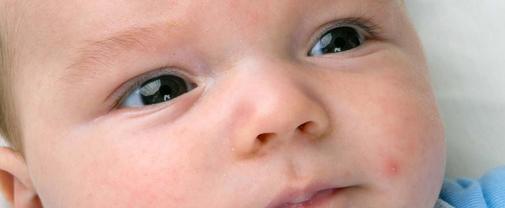Mothers often hear the phrase "as smooth as a baby's skin". In fact, many babies do not have smooth, blotchy skin that is known as infant milia.
content
What causes milia in a newborn?
Should and should not when the baby has milia
Do infant milia go away on its own?
Infant milia, also known as millet cysts, is a common phenomenon. Up to 20% of babies are born with milia. Tiny pimples usually appear on the cheeks, chin, forehead, and back as soon as the baby is born or a few weeks after birth to appear. Babies may develop more milia when they are hot, saliva, milk or clothing contact.
What causes milia in a newborn?
So far, research has been inconclusive on the causes of infant milia. Often babies will develop tiny pimples, appearing on the face, forehead, and hands and feet. Some scientists believe that the mother's hormone transferred to the baby in the last months of pregnancy is the cause of milia.
If the mother is taking the drug during pregnancy or the baby has a health problem and must take it, its medicinal properties can also cause milia as a side effect.
These blisters will become even redder when the baby's body heats up due to the weather or the baby is fussy and crying . When the baby's skin is irritated by contact with breast milk, saliva or detergent that is left on the clothes, milia also grows more.

Infant milia is usually benign, not of concern
Babies who drink formula can also get milia because they don't get along with milk that contains a lot of albumin protein.
Mothers eat a lot of hot foods and their baby's digestive system is not yet fully developed.
Another cause of infant milia can be an enlarged sebaceous gland.

Beware of neonatal dermatitis More than 90% of neonatal dermatitis is caused by external bacterial attacks. To protect your child's fragile and vulnerable skin, mothers need to learn about the risks of newborn babies with dermatitis as well as skin infections in babies.
Should and should not when the baby has milia
Although it does not require special care, infant milia still needs to be properly monitored and handled. Here are tips for mom.
Should: Keep children clean and dry. When choosing clothes for babies , choose ones that absorb sweat.
Do: Rinse baby's skin with warm water, baby shower gel and dry.
Do not: Dress your child in furry clothes because they can irritate their skin.
Do not: Rub vigorously every time you bathe your baby, and do not use soap with strong stimulants.
Do not: Allow direct sunlight on baby's skin. If sunbathing for babies , mothers should choose early morning or late afternoon time to keep babies from getting too hot.
Do not: Use creams, moisturizers and acne medications to treat children, because they can cause irritation and skin infections.
Do: Watch out for foods that can cause allergies in your baby. When you see that your baby has milia, the mother should maintain breastfeeding and not breastfeed any more formula . Mothers should avoid eating allergen-prone foods to ensure breastmilk does not have irritants for the baby. For babies who have weaned from food, it is important to limit food allergens such as peanuts, seafood, eggs ...
Do infant milia go away on its own?
While the different types of milia on a newborn baby's body can be quite a concern for mothers, they won't need special treatment. After a few weeks, these pimples should go away on their own.
However, there will be cases when a baby develops milia longer, even lasting a few months. If the mother observes that the baby's acne does not go away after 3 months or signs such as redness, pus, spreading on the face and on the body, this time should take the baby to a dermatological examination.

Skin diseases in babies During the first months, babies may encounter many problems such as scalp inflammation, allergy to laundry detergent, eczema ... What parents need to do to minimize skin diseases and handle Problems that upset your baby's skin?
In many cases, prolonged infant milia is also an indicator that acne skin will occur during puberty. However, mothers do not need to worry too much because the skin problems in children can be handled completely by modern technologies.














